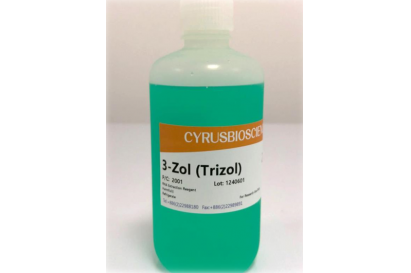Ready-to-use reagent for the isolation of total RNA from cells and tissues.
For processing tissues, cells cultured in monolayer or cell pellets.
3-Zol(TRizol) is an improved version of the single-step total RNA isolation reagent developed by Chomczynski.1 The RNA isolation method based on this reagent is widely used and proven for RNA applications2. It is ideal for quick, economical, and efficient isolation of total RNA or the simultaneous isolation of RNA, DNA, and proteins from samples of human, animal, plant, yeast, bacterial, and viral origin.
The resulting RNA can be used for Northern blots, mRNA isolation, in vitro translation, RNase protection assay, cloning, and PCR.
Features and Benefits
• Easily scalable RNA isolation
• Works with many sources: human, plant, yeast, bacterial, or viral
• Better yields than traditional guanidine thiocyanate/cesium chloride methods
This product, a mixture of guanidine thiocyanate and phenol in a monophase solution, effectively dissolves DNA, RNA, and protein on homogenization or lysis of tissue sample. After adding chloroform or 1-bromo-3-chloropropane and centrifuging, the mixture separates into 3 phases: an aqueous phase containing the RNA, the interphase containing DNA, and an organic phase containing proteins. Each component can then be isolated after separating the phases. One ml of TRI Reagent is sufficient to isolate RNA, DNA, and protein from 50-100 mg of tissue, 5-10 x106 cells, or 10 cm2 of culture dish surface for cells grown in monolayer.
Expected yields of RNA per mg of tissue or 1×10
6 cultured cells
Liver and spleen: 6~10ug
Kidney: 3~4ug
Skeletal muscles and brain: 1~1.5ug
Placenta: 1~4ug
Epithelial cells: 8~5ug
Fibroblasts: 5~7ug


